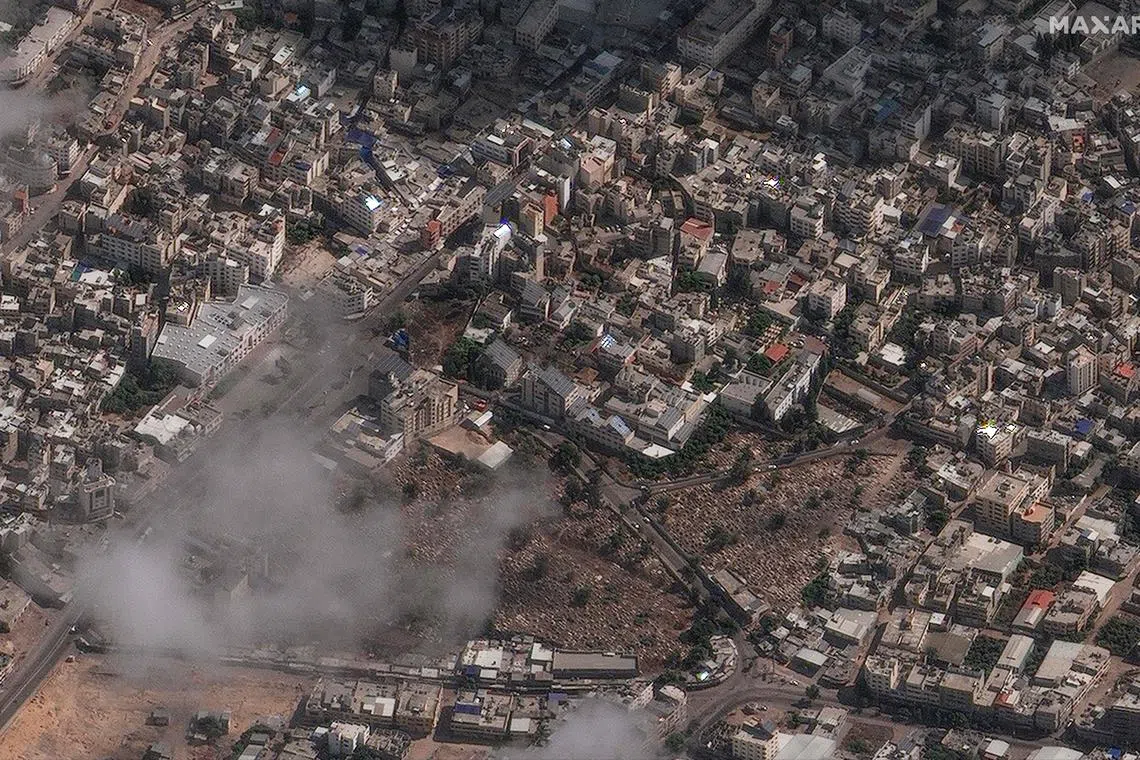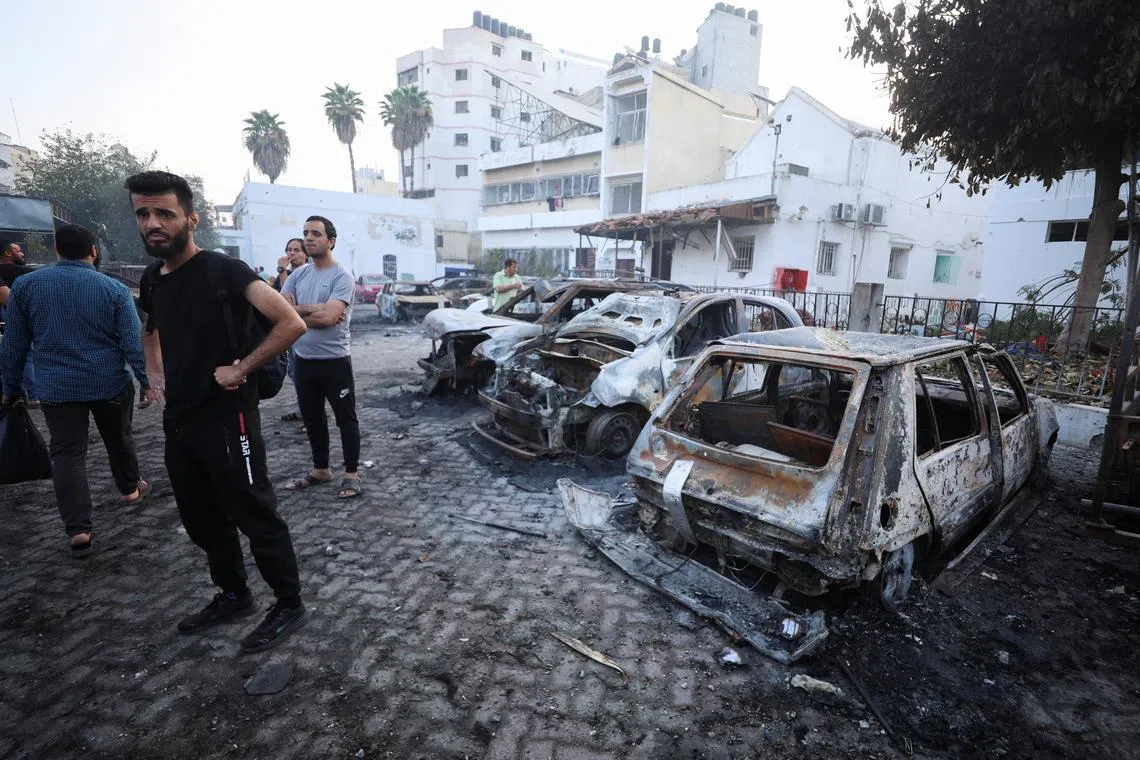Hamas fails to make case that Israel struck Gaza hospital
Sign up now: Get ST's newsletters delivered to your inbox

Hamas says it cannot find the munition that hit the site of the Gaza hospital.
PHOTO: AFP
Follow topic:
JERUSALEM – Five days after Hamas accused Israel of bombing a hospital in Gaza City
The group said it cannot find the munition that hit the site and has declined to provide details to support its count of the casualties.
Within an hour of Tuesday night’s blast, the Hamas-run Gazan Health Ministry accused Israel of attacking the Al Ahli Arab Hospital, a medical centre in Gaza City where scores of families had been sheltering.
The allegation was soon denied by Israel but quickly accepted and amplified by Arab leaders across the Middle East, setting off unrest throughout the region
The claim was widely cited by international news outlets, including The New York Times, before Israel issued its denial.
But in the days since, as new evidence contradicting the Hamas claim has emerged, the Gazan authorities have changed their story about the blast.
Spokesmen have released death tolls varying from 500 to 833, before settling on 471.
The Gazan Health Ministry has also declined to release further details about those 471 victims.
All traces of the munition have seemingly vanished from the site of the blast, making it impossible to assess its provenance.
Raising further questions about Hamas’ claims, the impact site turned out to be the hospital carpark, not the hospital itself.
On Sunday, Hamas turned down requests to view any available evidence of the munition it said had struck the hospital, claiming that it had disintegrated beyond recognition.
“The missile has dissolved like salt in the water,” said Mr Ghazi Hamad, a senior Hamas official, in a phone interview. “It’s vaporised. Nothing is left.”
Mr Salama Maroof, head of the Hamas-run government media office, said in a text message: “Who says we’re obligated to present the remnants of every rocket that kills our people? In general, you can come and research and confirm for yourself from the evidence we possess.”

People inspect the area of Al Ahli Arab Hospital where hundreds of Palestinians were killed in a blast, in Gaza City, on Oct 18.
PHOTO: REUTERS
For Palestinians, the accusation of Israeli responsibility for the blast has cemented the perception that Israel’s response to the Hamas-led attacks on southern Israel on Oct 7
The Gazan Health Ministry says Israeli strikes have killed almost 5,100 Palestinians, 40 per cent of them children.
The high reported death toll has undermined international support for Israel’s counter-attack.
But to Israelis, the accusation that Israel hit the hospital is part of a grand deception aimed at undermining the legitimacy of the country’s response to what officials say was the deadliest single attack on Jews since the Holocaust.
About 1,400 people were killed in Hamas’ raid on Oct 7 and more than 200 people were taken hostage.
Israel said the strike on the hospital carpark was caused by a misfired Palestinian rocket, citing intelligence intercepts and videos of the sky above Gaza at the time.
The Israeli military said the rocket was fired by Palestinian Islamic Jihad, an armed group in Gaza allied with Hamas.
It said the rocket malfunctioned in midair and exploded when its propellant caught fire upon hitting the ground.
Rear-Admiral Daniel Hagari said in a press briefing on Oct 18: “According to our intelligence, Hamas checked the report, understood it was an Islamic Jihad rocket that had misfired and decided to launch a global media campaign to hide what really happened.”
The military also said Palestinian armed groups had mistakenly fired more than 550 rockets into their own territory since the war began more than two weeks ago.
The claim could not be immediately verified, but Palestinian groups have previously acknowledged that their rockets land in Gaza.
Video footage in 2022 showed one zigzagging through the air shortly after launch, before plummeting into a civilian area.
“We have made mistakes; I am not going to deny it,” Mr Musab Al-Breim, a spokesman for Islamic Jihad, said in an interview last Wednesday. “However, not mistakes of this size.”
Israel has also turned down requests to provide logs of all its military activity in the area at the time of the strike and declined to specify the video on which it based its assessment of Palestinian responsibility.
Israeli messaging about the rocket launch site has also been inconsistent: Mr Hagari suggested the errant rocket was launched from a cemetery close to the hospital, while a map posted online by the military suggested the launch site was farther away.
But the Biden administration has backed Israel.
United States officials say multiple strands of early intelligence, including infrared satellite data, show a launch of a rocket or missile from Palestinian fighter positions within Gaza.
A visual investigation conducted by The Wall Street Journal strongly supported the Israeli interpretation, while investigations by The Associated Press and CNN also tentatively backed it.
All three investigations cited television footage they said appeared to show a misfired Palestinian rocket in the sky above the hospital.
They also cited experts who said the damage at the site did not resemble that typically caused by an Israeli missile strike.
Forensic Architecture, a London-based visual investigation group, disputed the Israeli account, saying that the munition had been fired from the direction of Israel.
Al Jazeera, a Qatari news channel, concluded that a Palestinian rocket had been intercepted by an Israeli air defence missile. Both are often critical of Israeli policies.
Without examining the munition that hit the parking lot, it may be impossible to draw a definitive conclusion about who fired it.
But by the time reporters arrived at the site on the morning after the blast, any remnants of the munition appeared to have been removed, preventing independent analysis of its origin.
Reporters and photographers who toured the site that day found a shallow dent in the ground but no deep crater of the kind usually caused by an Israeli precision-guided missile used in an air strike. NYTIMES

